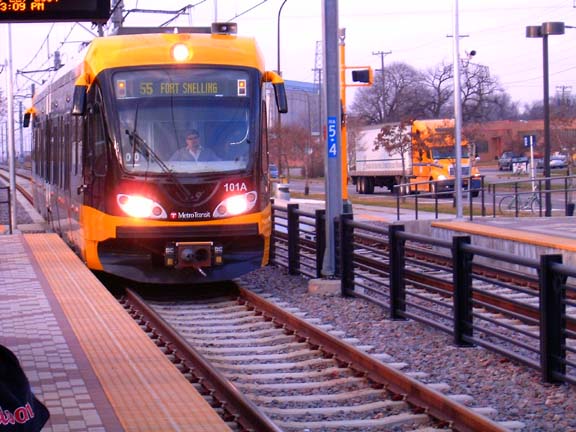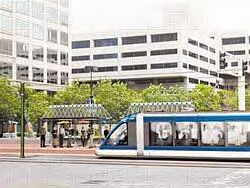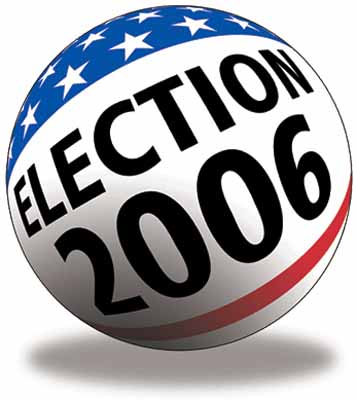 California: Huge win with the passage of over $40 billion
of public works bonds, including a $20 billion transportation package of which $4
billion is allocated to public transportation projects. For Los Angeles alone, this
will mean an additional one billion dollars in new discretionary funding.
California: Huge win with the passage of over $40 billion
of public works bonds, including a $20 billion transportation package of which $4
billion is allocated to public transportation projects. For Los Angeles alone, this
will mean an additional one billion dollars in new discretionary funding.
 Minnesota: Major win for public transportation, as voters
approved an amendment to the state constitution that locks the state
government into spending more money on roads and public transit by restoring
all money collected from the sales tax on motor vehicles to transportation - a
move that's expected to funnel an extra $300 million a year into transportation
projects, including not less than 40% of revenues for transit – a whopping $120 million per year.
Minnesota: Major win for public transportation, as voters
approved an amendment to the state constitution that locks the state
government into spending more money on roads and public transit by restoring
all money collected from the sales tax on motor vehicles to transportation - a
move that's expected to funnel an extra $300 million a year into transportation
projects, including not less than 40% of revenues for transit – a whopping $120 million per year.
 Minnesota's voter-approved amendment to dedicate 40% of motor vehicle sales taxes to public transport could mean major influx of funding for expansion and improvement of services, such as Minneapolis LRT system, shown here.
Minnesota's voter-approved amendment to dedicate 40% of motor vehicle sales taxes to public transport could mean major influx of funding for expansion and improvement of services, such as Minneapolis LRT system, shown here.
[Photo: Joe Kurland]
 Seattle: Major win for public transit, particularly in the
approval of Proposition 2, which will permanently increase sales taxes by one-tenth of one percent to expand Metro bus service. Prop. 1, a nine-year property tax
increase, will address the city's backlog of street, bridge, and sidewalk repairs, plus a host of transit, bike path, and safety improvements.
Seattle: Major win for public transit, particularly in the
approval of Proposition 2, which will permanently increase sales taxes by one-tenth of one percent to expand Metro bus service. Prop. 1, a nine-year property tax
increase, will address the city's backlog of street, bridge, and sidewalk repairs, plus a host of transit, bike path, and safety improvements.
 Kansas City: A huge win for rail transit ... In what the Kansas City Star calls "a stunning upset", local activist Clay Chastain's
persistent, nearly decade-long crusade for light rail transit (LRT) won Kansas City voter approval, passing 54 percent to 46 percent.
It was Chastain's seventh ballot attempt in nine years.
The measure approves a 25-year extension of a 3/8-cent sales tax to help pay for a 27-mile
light rail transit line, electric shuttle buses, and a cable-gondola system.
The measure was opposed by almost all of Kansas City's political establishment, along with
the Area Transportation Authority and the Regional Transit Alliance, and some
local leaders are expressing reluctance to implement the LRT plan, despite voters' endorsement.
However, campaign supporters are determined to see it carried out.
Kansas City: A huge win for rail transit ... In what the Kansas City Star calls "a stunning upset", local activist Clay Chastain's
persistent, nearly decade-long crusade for light rail transit (LRT) won Kansas City voter approval, passing 54 percent to 46 percent.
It was Chastain's seventh ballot attempt in nine years.
The measure approves a 25-year extension of a 3/8-cent sales tax to help pay for a 27-mile
light rail transit line, electric shuttle buses, and a cable-gondola system.
The measure was opposed by almost all of Kansas City's political establishment, along with
the Area Transportation Authority and the Regional Transit Alliance, and some
local leaders are expressing reluctance to implement the LRT plan, despite voters' endorsement.
However, campaign supporters are determined to see it carried out.
 Kansas City voters' thumbs-up to grassroots-initiated LRT plan could lead to revival of 2001 plan. Rendition shows simiulation of LRT system in downtown Kansas City.
Kansas City voters' thumbs-up to grassroots-initiated LRT plan could lead to revival of 2001 plan. Rendition shows simiulation of LRT system in downtown Kansas City.
[Graphic: KCATA]
 Spokane: A loss for rail transit, as voters rejected two
"advisory" questions which would have given a green light to the transit
authority's plans for a $263 million diesel-powered light railway project.
Proposition 1, asking if a funding package (probably including a local sales tax
increase of up to 0.3 percent ) should be determined, was defeated 56%-44%.
The second question, asking if Spokane Transit should use its existing resources
to pay for engineering studies and design work, was defeated 54%-46%.
The No vote to both questions probably kills the project for the foreseeable future.
Spokane: A loss for rail transit, as voters rejected two
"advisory" questions which would have given a green light to the transit
authority's plans for a $263 million diesel-powered light railway project.
Proposition 1, asking if a funding package (probably including a local sales tax
increase of up to 0.3 percent ) should be determined, was defeated 56%-44%.
The second question, asking if Spokane Transit should use its existing resources
to pay for engineering studies and design work, was defeated 54%-46%.
The No vote to both questions probably kills the project for the foreseeable future.
 Sonoma-Marin (California) Area: A loss for rail transit, as
Measure R, which would have authorized a quarter-cent sales tax for 20 years to
build and operate a diesel-powered rail transit line (plus pedestrian and bicycle
facilities), narrowly failed with 65% of the vote, 2 points
short of the required 67% (2/3). Sonoma County voters gave the measure 69.3
percent approval but only 57.3 percent of Marin County voters approved the
measure. However, local rail advocates are planning to regroup, with a view to
placing a rail plan back on the ballot in 2008.
Sonoma-Marin (California) Area: A loss for rail transit, as
Measure R, which would have authorized a quarter-cent sales tax for 20 years to
build and operate a diesel-powered rail transit line (plus pedestrian and bicycle
facilities), narrowly failed with 65% of the vote, 2 points
short of the required 67% (2/3). Sonoma County voters gave the measure 69.3
percent approval but only 57.3 percent of Marin County voters approved the
measure. However, local rail advocates are planning to regroup, with a view to
placing a rail plan back on the ballot in 2008.
 Broward County (Ft. Lauderdale, Florida area): A loss for
transit, as voters overwhelmingly rejected increasing the local sales tax to
improve mass transit. A major component would have been a light rail starter
system.
Broward County (Ft. Lauderdale, Florida area): A loss for
transit, as voters overwhelmingly rejected increasing the local sales tax to
improve mass transit. A major component would have been a light rail starter
system.
 Salt Lake City area: A big win for public transit, as Salt
Lake County voters approved, by 64 percent, Proposition 3, raising the sales tax
by a quarter-cent to pay for rail expansion and road projects.
Salt Lake City area: A big win for public transit, as Salt
Lake County voters approved, by 64 percent, Proposition 3, raising the sales tax
by a quarter-cent to pay for rail expansion and road projects.
 Grapevine (Ft. Worth, Texas area): Major win for rail
transit, as Proposition 1, an economic development one-half-percent sales tax,
which was largely focused on bringing regional passenger rail ("commuter
rail") from Ft. Worth to Grapevine, was supported by 73 percent of voters.
Grapevine (Ft. Worth, Texas area): Major win for rail
transit, as Proposition 1, an economic development one-half-percent sales tax,
which was largely focused on bringing regional passenger rail ("commuter
rail") from Ft. Worth to Grapevine, was supported by 73 percent of voters.
 Nationwide: Generally, a huge net win for public transport,
as dozens of Road Warrior legislators and local political opponents of public
transportation were replaced by others somewhat more favorable to investment
in surface public transport and other alternatives to private motor vehicle and air
travel.
Nationwide: Generally, a huge net win for public transport,
as dozens of Road Warrior legislators and local political opponents of public
transportation were replaced by others somewhat more favorable to investment
in surface public transport and other alternatives to private motor vehicle and air
travel.
